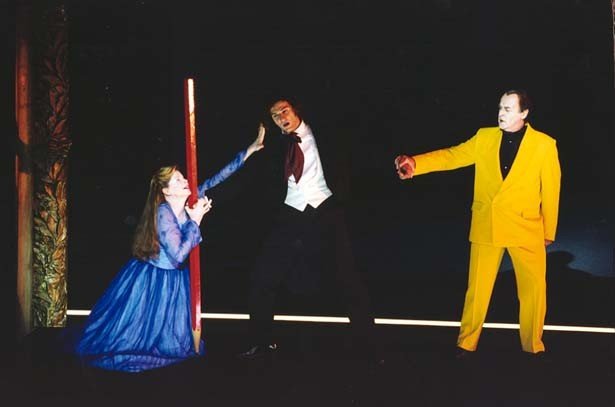|
|
|
|
|
|
|
|
| Financial Times, Jun 10, 2002 |
| By Richard Fairman |
La damnation de Faust, Brüssel, 4 June 2002
|
Pencils do battle with Berlioz
|
|
 For the Brussels public these have been 10 good
years. Antonio Pappano's decade as music director of the Théâtre Royal de la
Monnaie has lifted the company high in the international opera rankings,
while he himself has risen to the top of the "most wanted" list of
conductors. For the Brussels public these have been 10 good
years. Antonio Pappano's decade as music director of the Théâtre Royal de la
Monnaie has lifted the company high in the international opera rankings,
while he himself has risen to the top of the "most wanted" list of
conductors.
It has been a fruitful period of collaboration, which is now coming to an
end. The new production of Berlioz's La Damnation de Faust, which opened
last week, is Pappano's last in Brussels before he moves to take up his new
position at Covent Garden in the autumn. The press was there en masse, the
Belgians to bid him farewell, the British to see in advance what they can
expect in London.
Appropriately enough, this final production was like a souvenir brochure of
what the Pappano years in Brussels were all about - dynamic leadership,
strong musical values, celebrity singers in a couple of the key roles and a
producer with a big ego delivering his stock ideas regardless of artistic
sense. Let us be charitable and call it a "European" style of production.
This will be Pappano's Achilles heel, if anything is. Nobody is likely to
take against a man who is so open and sociable, or a musician with his
all-round skills. Pappano is also one of those rare conductors who bonds
with singers and, with luck, his years at the Royal Opera will attract a
stream of vocal stars to London. But the artistic relationships he has
cultivated with producers look more problematical.
There is a certain kind of production that is everywhere in the northern
half of continental Europe: an empty stage, a heavyweight symbol or two, and
many little sillinesses to fill out the evening. This Damnation de Faust,
produced and designed and with lighting and costumes by Roland Aeschlimann,
was one of them, and it is not encouraging that it followed an Aida by the
American Robert Wilson that could have been its operatic twin brother.
Berlioz described his version of Faust as a "légende dramatique", but it has
been staged at regular intervals since the end of the 19th century. To
justify pe rforming it as an opera, the producer needs to tap an imagination
as vivid as Berlioz's own. Aeschlimann seems to regard the piece drily as a
symbolic meeting of words and music: Faust spent his opening solo fondling a
gigantic pencil, while Méphistophélès arrived with a double-bass which was
trundled back and forth. The Hungarian March became a miniature battle of
the pencils, like something out of Tchaikovsky's Nutcracker. At the end,
Méphistophélès symbolically broke the pencil in two. Oh, to have been given
a gigantic rubber and erased the whole production.
The singers mostly offered compensation. Susan Graham, sounding more like a
soprano every day, was a delectable Marguerite, light-hearted and fresh, and
singing in excellent French. José van Dam's once noble baritone is slowly
evaporating, but he does wonders with the dry remnants of it, getting every
word of Méphistophélès to cast a satanic spell. As Faust himself, Jonas
Kaufmann had little personality and his vocal solution to the famously
difficult duet with Marguerite came a cropper. Henry Waddington was a
strong Brander.
As always, Pappano presided over a performance of high musical standards.
There are other conductors who have a hotline to Berlioz's wild and personal
musical world, which he cannot claim, but everything he does is alive and -
more important - makes theatre. Pappano is an all-rounder who, in his 10
years at La Monnaie/De Munt, has turned his hand to Verdi and Wagner,
Puccini and Strauss, Britten and Shostakovich, with equal success. Brussels
generously gave him the opportunity to mature as a conductor. He, in turn,
leaves the company on a high. |
|
|
|
|
|
|
|
|
|
|
|
|
|
|
|
|
|
|